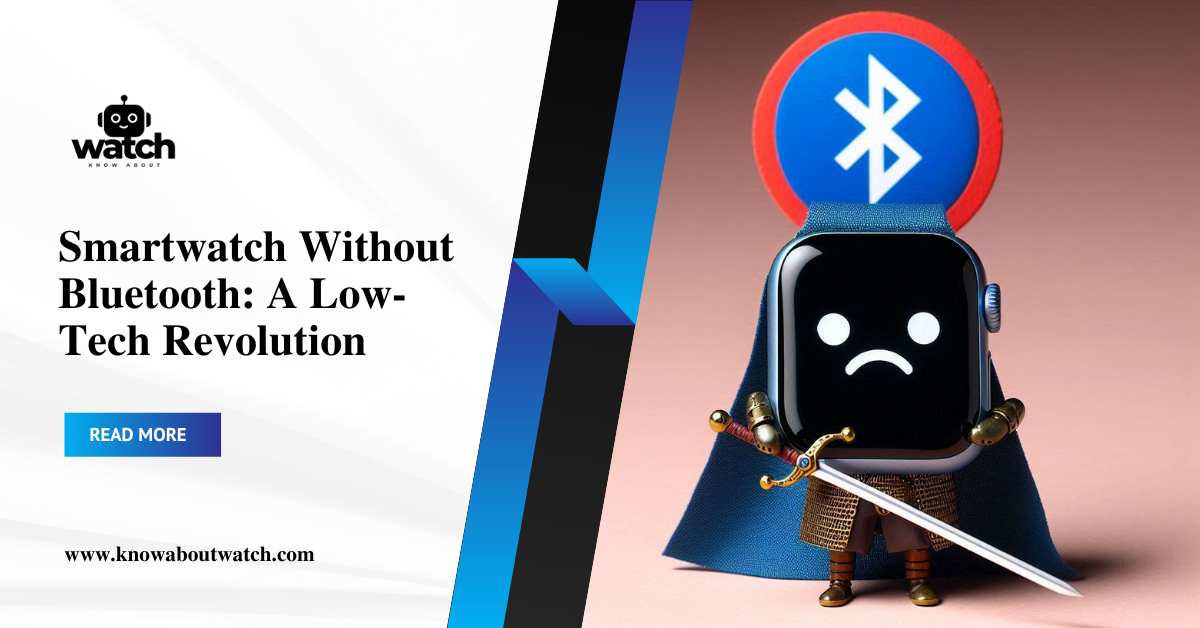In today’s world, where technology constantly evolves, the idea of a “smartwatch without Bluetooth” might sound like a throwback to simpler times. After all, isn’t Bluetooth one of the defining features of most modern smartwatches? While it might seem counterintuitive, there’s a growing demand for smartwatches that keep things simple. These watches focus on delivering key features without the constant connectivity that Bluetooth provides, making them appealing to those who prefer minimalism, and privacy, or are concerned about the health implications of wireless tech.
In this article, we’ll dive into why someone might prefer a smartwatch without Bluetooth, the benefits, and potential drawbacks, and explore some of the best models on the market. We’ll also highlight how this niche technology is carving out space for itself in a world dominated by hyper-connectivity.

Why Consider a Smartwatch Without Bluetooth?
1. Simplicity Over Sophistication
The idea of a smartwatch is typically associated with robust functionalities like notifications, fitness tracking, music control, and seamless integration with smartphones. Bluetooth, often a backbone for this connectivity, allows smartwatches to talk to smartphones and other devices. However, not everyone needs or wants these constant interactions.
For some, a smartwatch without Bluetooth offers a refreshing break from information overload. These users may be looking for basic time-telling functionality, fitness tracking, or other essential features without the distractions of constant alerts or syncing. If your primary focus is simplicity, a Bluetooth-free smartwatch can be the perfect solution.
2. Privacy and Security Concerns
In an age where data privacy is increasingly in the spotlight, many people are wary of the potential risks associated with wearable technology. Bluetooth, while convenient, can pose security vulnerabilities. Hackers can potentially exploit Bluetooth to access sensitive data on your smartwatch, including health information and personal messages.
For privacy-conscious users, smartwatches without Bluetooth provide an added layer of security. With no wireless connection to be hacked, you can rest easy knowing that your data remains private. This makes Bluetooth-free smartwatches particularly appealing to those working in sensitive environments or who simply value their privacy.
3. Reduced Electromagnetic Radiation Exposure
Another reason people opt for smartwatches without Bluetooth is health-related. Concerns have been raised about the constant exposure to electromagnetic radiation from Bluetooth-enabled devices, especially for those who wear smartwatches 24/7. Although the science on this topic is still inconclusive, some users prefer to err on the side of caution.
By choosing a smartwatch without Bluetooth, individuals can reduce their exposure to wireless signals. This can offer peace of mind to those who are concerned about the potential long-term effects of such exposure.
4. Battery Life and Performance
Bluetooth connectivity, though highly useful, is a known battery drainer. The continuous syncing between your smartwatch and smartphone consumes a significant amount of power, resulting in the need to charge your device more frequently.
Smartwatches without Bluetooth often boast longer battery life, sometimes lasting weeks or even months on a single charge. This is a huge advantage for users who prioritize performance and longevity over the constant need to stay connected.

What Can You Do With a Smartwatch Without Bluetooth?
While it’s true that a Bluetooth-free smartwatch will have fewer features compared to its connected counterparts, it doesn’t mean you’re sacrificing all functionality. Below are some key features that you can still enjoy on a smartwatch without Bluetooth:
1. Timekeeping
At its core, a smartwatch without Bluetooth remains an excellent timepiece. Some models come with advanced timekeeping features, such as world clocks, timers, and alarms, giving you more control over your schedule.
2. Fitness Tracking
Many Bluetooth-free smartwatches include built-in fitness tracking features like step counting, calorie tracking, and heart rate monitoring. These features work autonomously, meaning you don’t need to sync your data with a smartphone app to get valuable insights into your daily activity.
3. Sleep Monitoring
Some smartwatches without Bluetooth come with sleep-tracking capabilities, allowing you to monitor your sleep patterns and quality. You can wake up to a report on your watch screen without needing a Bluetooth connection to see your results.
4. Waterproof and Rugged Design
Often, Bluetooth-free smartwatches are designed for durability. Many models are waterproof and built to withstand tough conditions, making them perfect for outdoor enthusiasts, swimmers, or people who lead active lifestyles.
5. Long-Lasting Battery
Since Bluetooth connectivity drains a significant amount of battery, smartwatches without it tend to last much longer on a single charge. Some of these watches can go weeks without needing to be plugged in, which is a great feature for users who prioritize longevity and low maintenance.
Popular Models of Smartwatches Without Bluetooth
1. Garmin Forerunner 35
The Garmin Forerunner 35 is a fantastic choice for runners and fitness enthusiasts who don’t need Bluetooth functionality. It comes equipped with GPS tracking, heart rate monitoring, and various fitness modes that allow you to track your runs and workouts with ease.
2. Withings Move
Withings Move is an elegant hybrid smartwatch that tracks your steps, sleep, and calories without needing Bluetooth connectivity. It has a traditional analogue design but offers modern health-tracking features, and the best part is that its battery lasts up to 18 months.
3. Casio Pro Trek
For adventurers who prefer minimalism, the Casio Pro Trek offers great utility without Bluetooth. This watch is equipped with a digital compass, barometer, altimeter, and more, making it ideal for outdoor activities.

The Drawbacks of Smartwatches Without Bluetooth
While opting for a smartwatch without Bluetooth can be appealing, it’s essential to recognize the limitations. For one, you won’t be able to receive smartphone notifications, make hands-free calls, or enjoy the convenience of syncing data to apps on your phone.
Additionally, without Bluetooth, transferring fitness data or software updates can be more cumbersome. For users who rely on connected features for work, communication, or entertainment, a Bluetooth-free smartwatch may feel limiting.
Conclusion: Is a Smartwatch Without Bluetooth Right for You?
Smartwatches without Bluetooth cater to a specific niche of users—those who prioritize simplicity, privacy, and long battery life over constant connectivity. If you find yourself overwhelmed by notifications, concerned about security risks, or simply looking for a longer-lasting device, a Bluetooth-free smartwatch could be the perfect fit.
Before making your choice, consider your lifestyle and what you truly need from a smartwatch. Whether you’re an adventurer, a privacy-conscious professional, or someone who enjoys minimalist tech, a smartwatch without Bluetooth offers a unique set of advantages that shouldn’t be overlooked.
Looking for more insights on wearable tech?
Also, read the following blogs on smartwatches:
Visit our website KnowAboutWatch for more articles on the best smartwatches tailored to your needs!
FAQs
Can a smartwatch work without Bluetooth?
Yes, a smartwatch can work without Bluetooth. Many smartwatches are equipped with standalone features like timekeeping, fitness tracking, heart rate monitoring, and sleep tracking. These functionalities operate independently of Bluetooth and don’t require a connection to a smartphone. While you won’t have access to phone notifications, app syncing, or wireless data transfer, basic smartwatch functions still work without Bluetooth.
Is Bluetooth necessary for smartwatches?
No, Bluetooth is not necessary for all smartwatches. While many modern smartwatches use Bluetooth to connect to smartphones for notifications, calls, and app data syncing, some models focus on standalone features like tracking fitness, monitoring sleep, or just telling time. These models can work perfectly fine without Bluetooth, offering users a more simplified experience without wireless connectivity.
Can I connect my watch to my phone without Bluetooth?
Typically, smartwatches connect to smartphones via Bluetooth for notifications, calls, and syncing data. However, some smartwatches may offer other connectivity options like Wi-Fi or cellular networks (LTE models) that allow you to interact with your phone without Bluetooth. In these cases, the watch may use Wi-Fi or direct cellular communication for notifications or data transfer.
Can I use a Bluetooth smartwatch without a phone?
Yes, you can use a Bluetooth smartwatch without a phone for many standalone features like tracking steps, monitoring heart rate, and checking the time. However, without a phone connection, you won’t be able to receive notifications, make calls, or sync data to apps. Some smartwatches also have built-in cellular connectivity, which allows them to work independently of a phone for certain tasks.

